Sir John Monash, Personal Files Book 1, 5 November - 15 December 1914 - Part 3
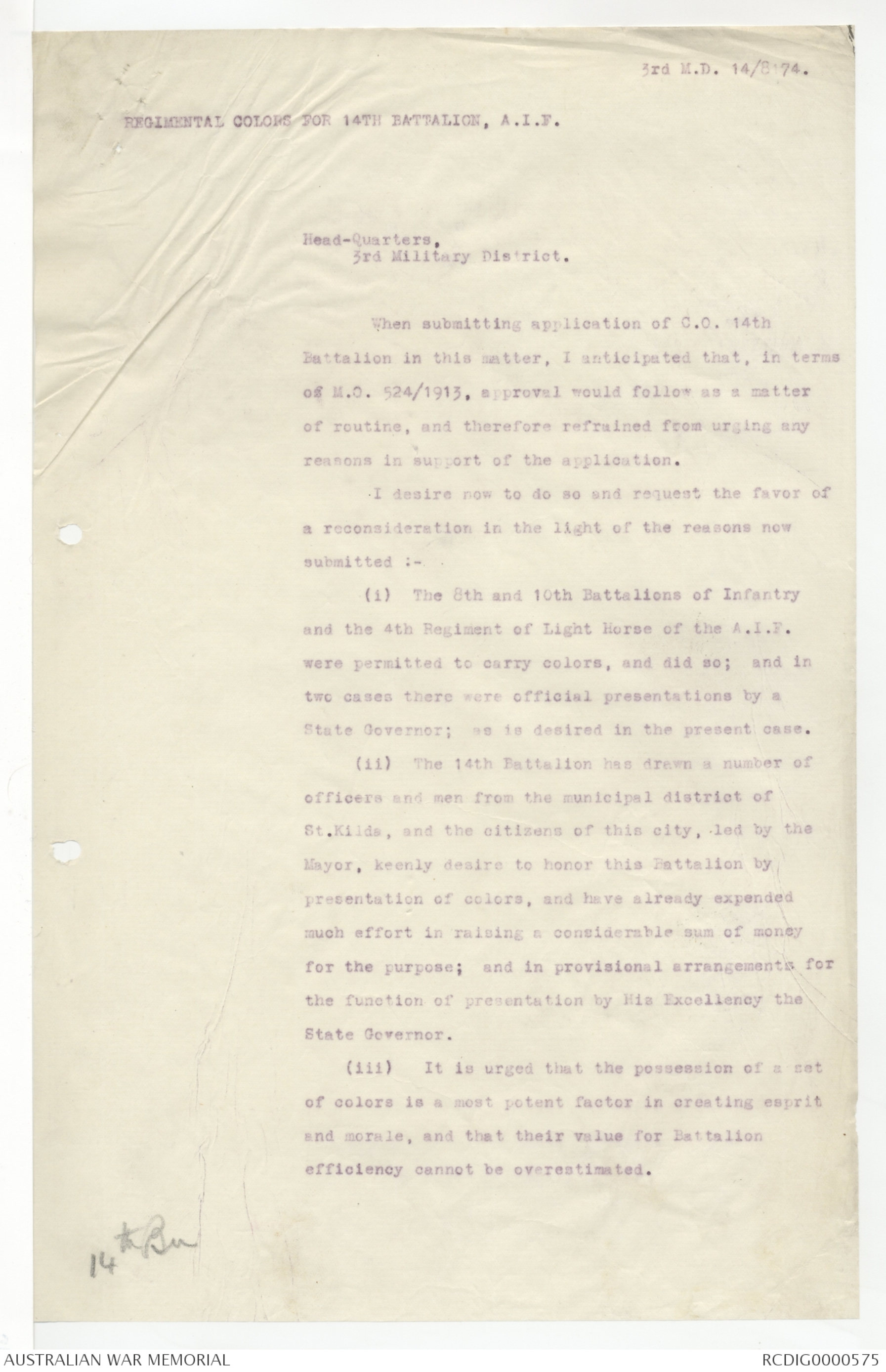
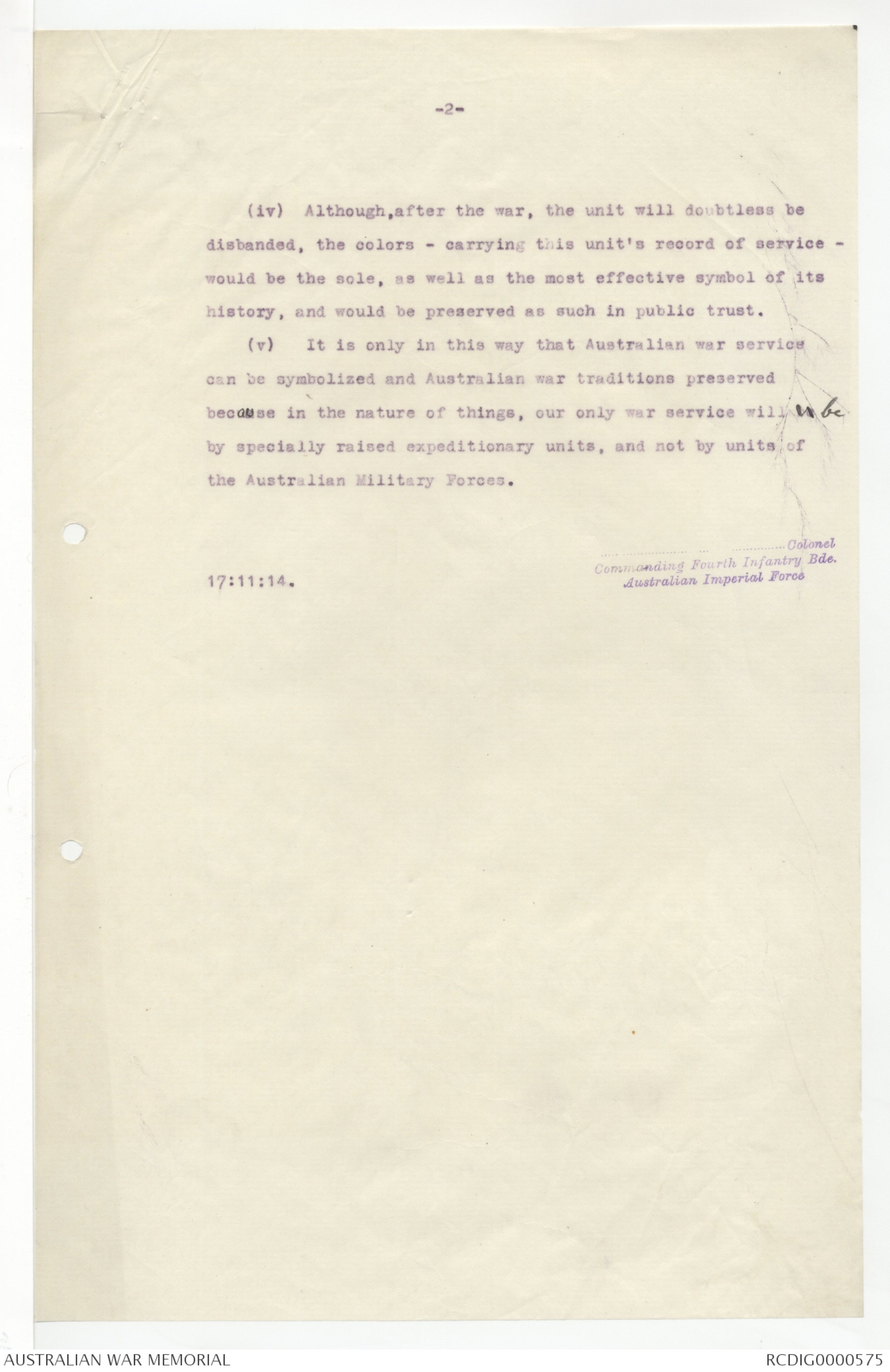
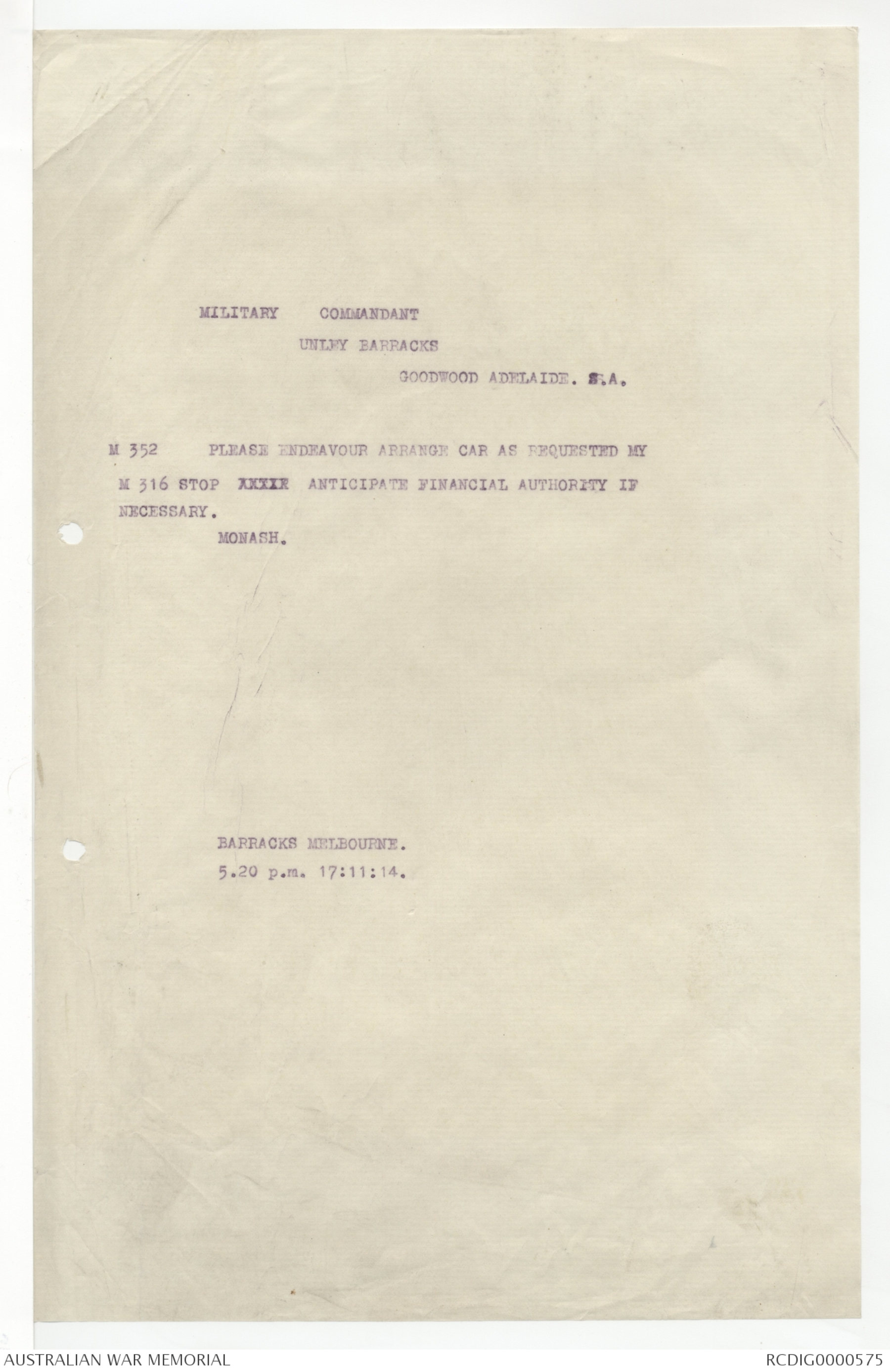
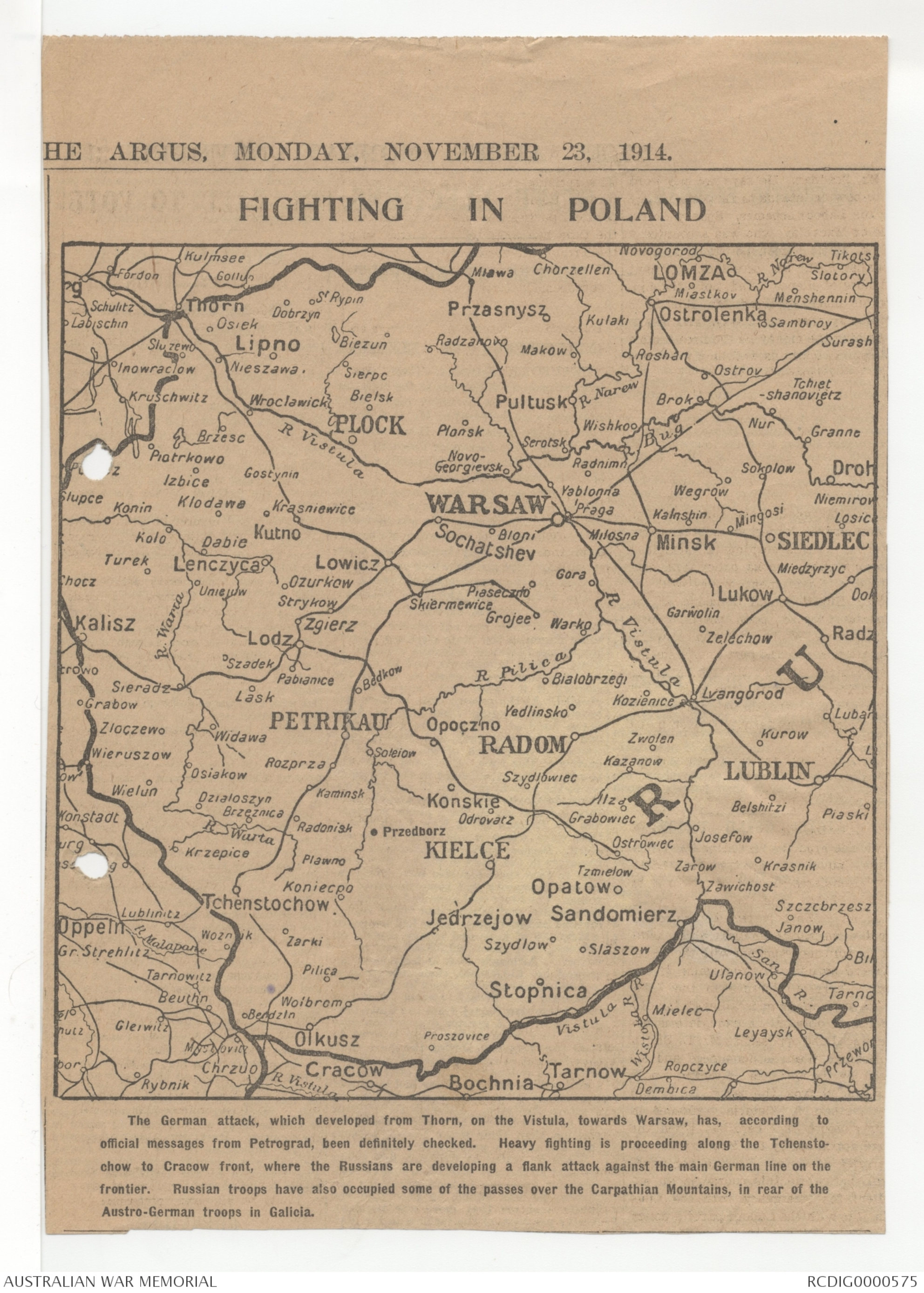
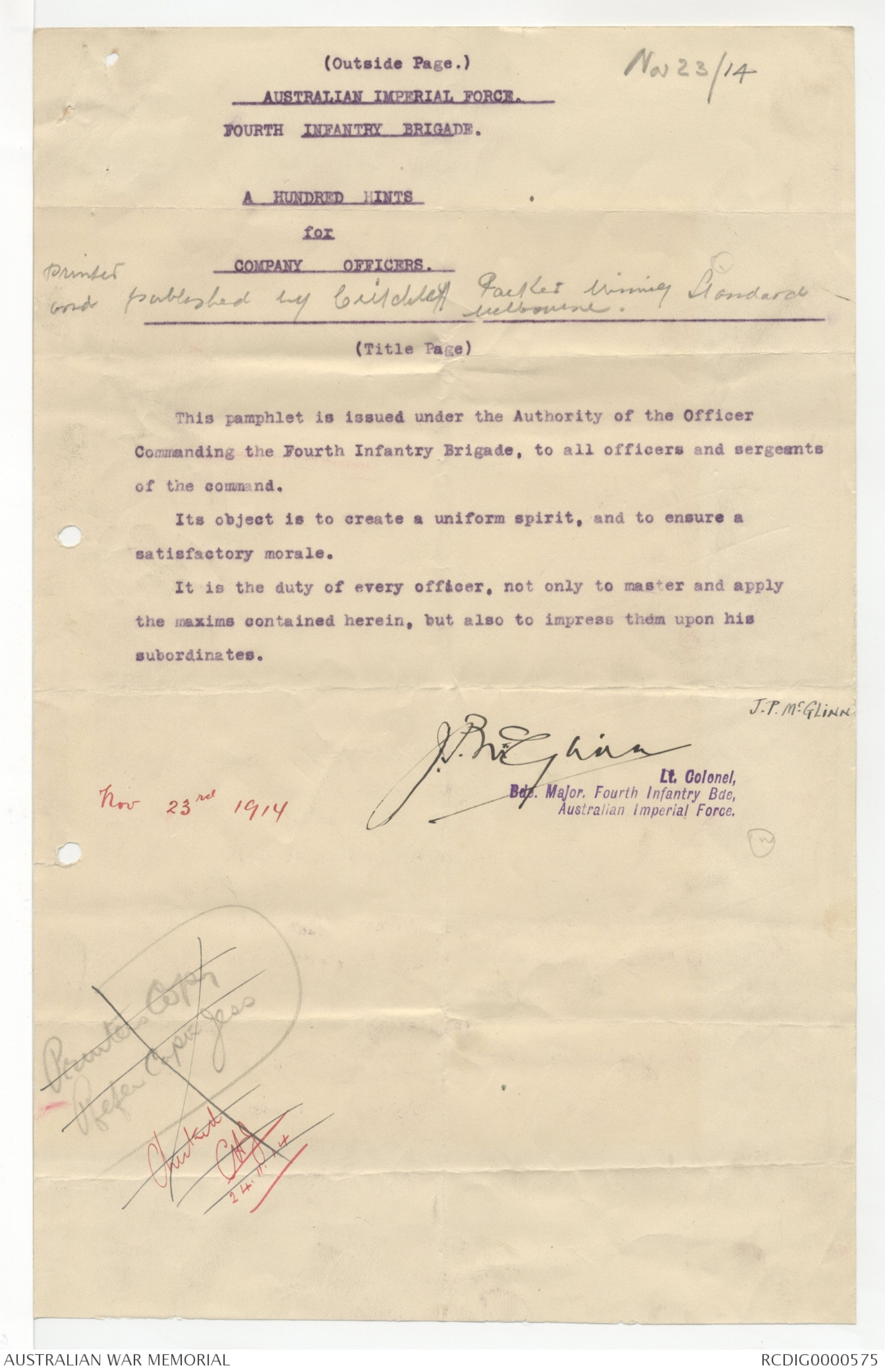
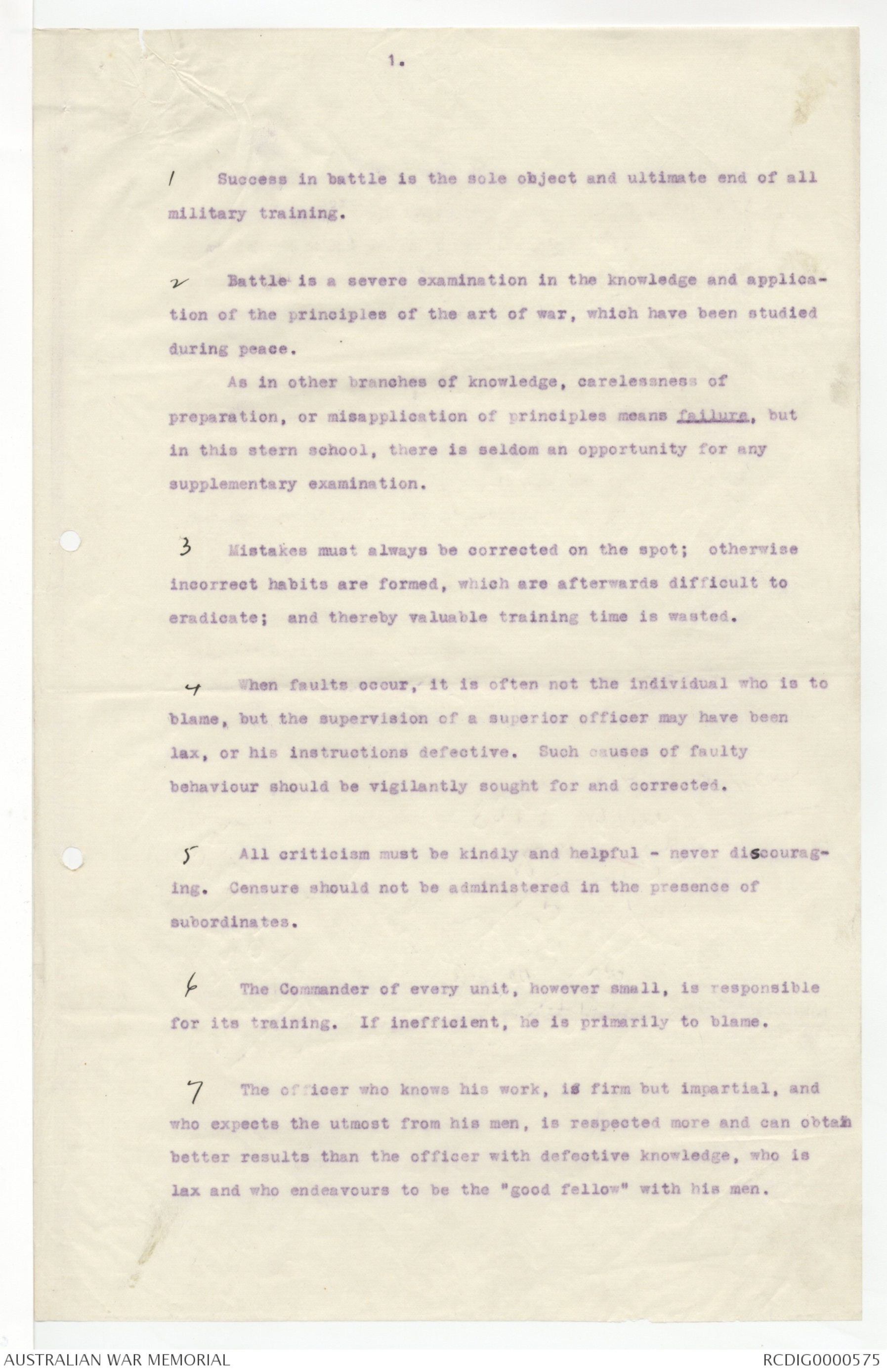
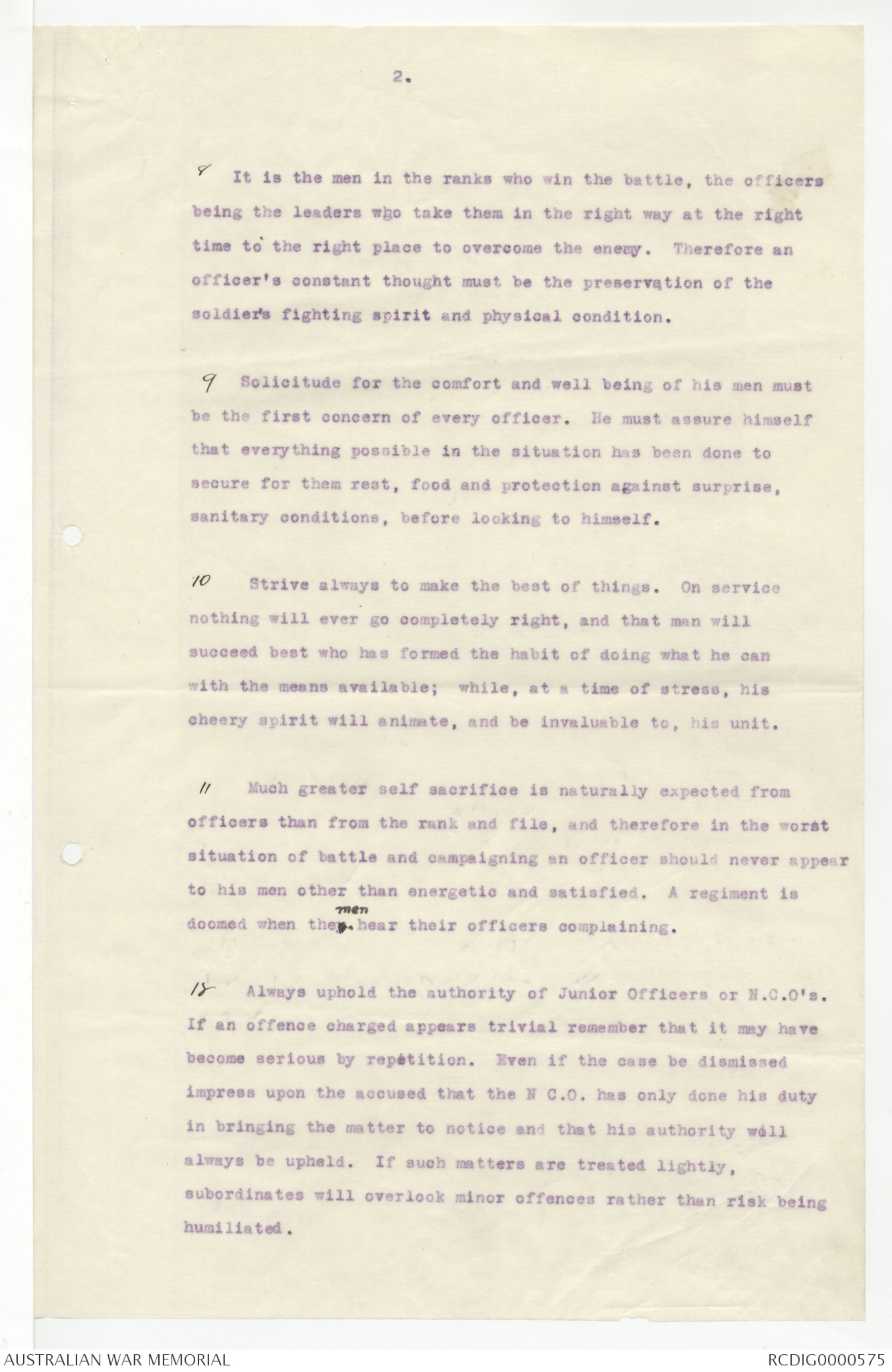
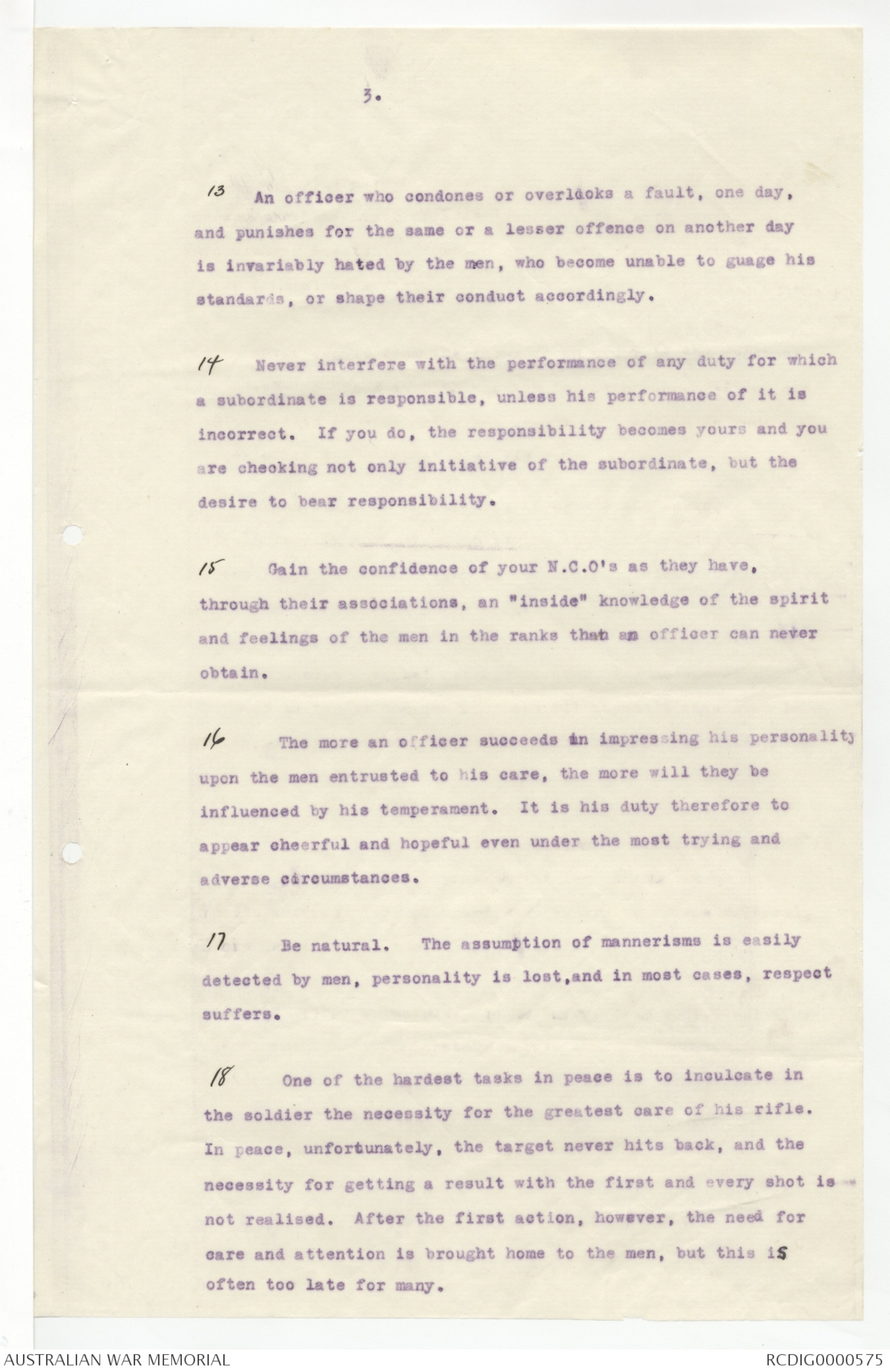
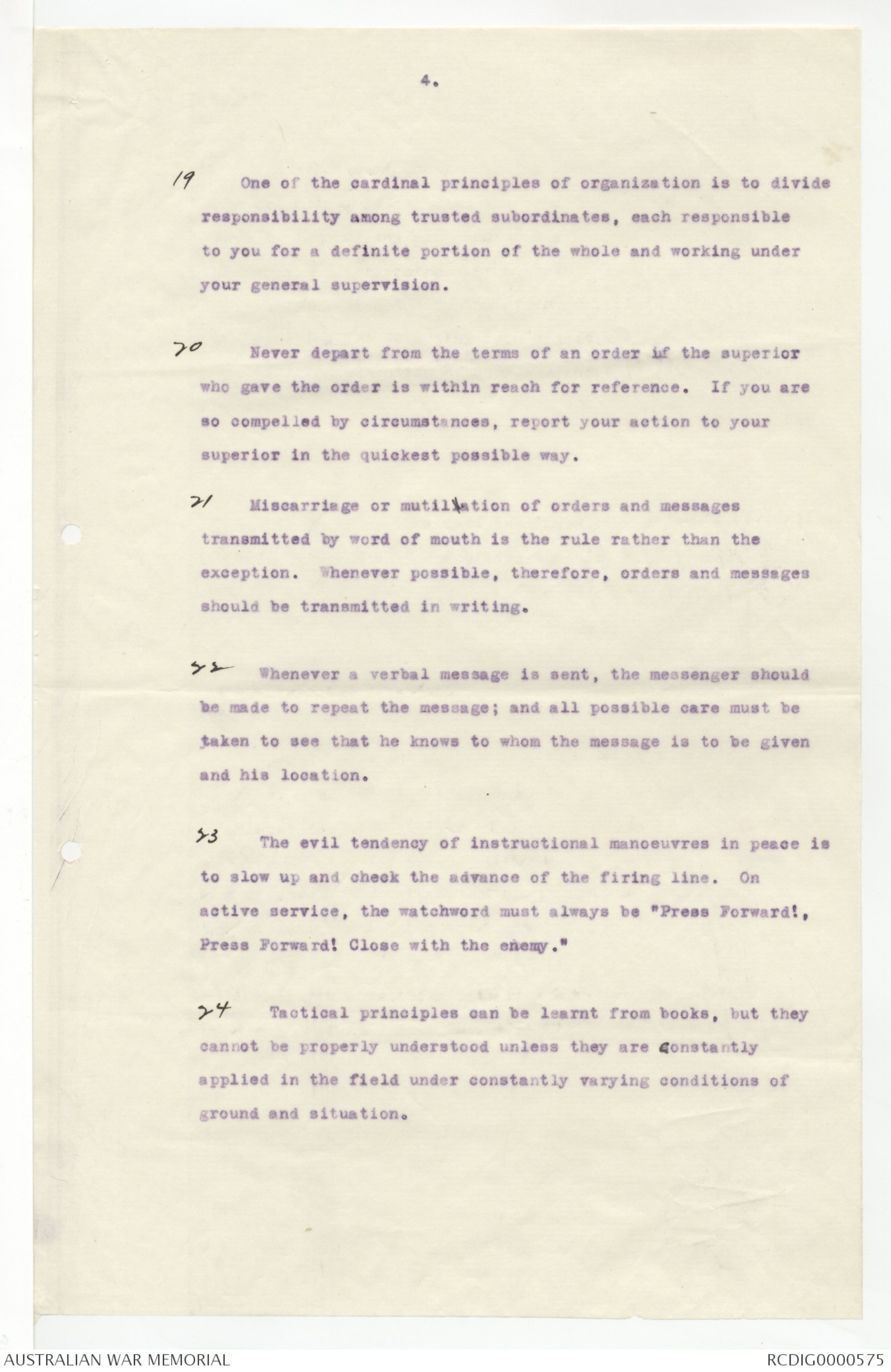
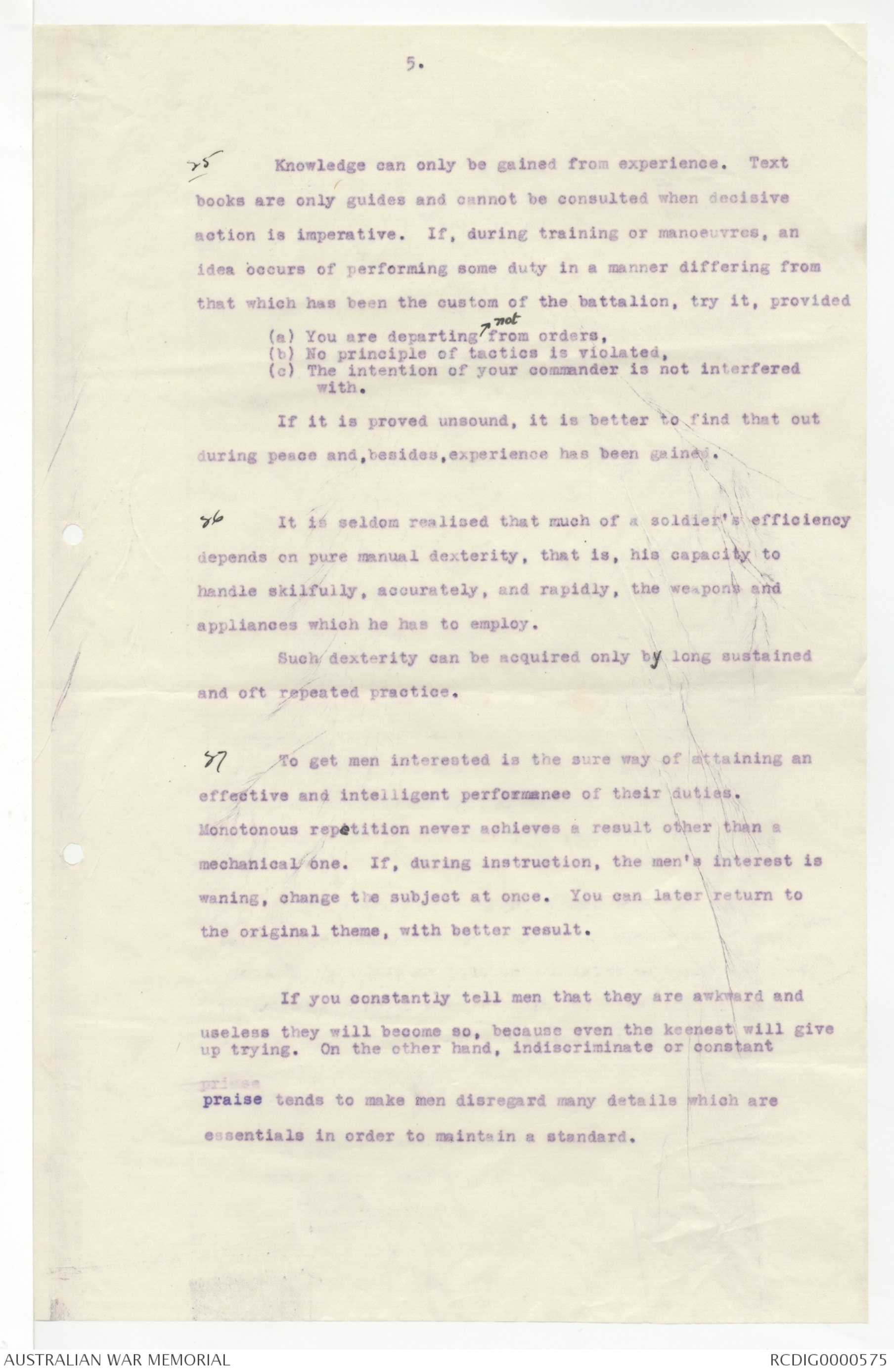
3rd M.D. 14/8174.
REGIMENTAL COLORS FOR 14TH BATTALION, A.I.F.
Head-Quarters,
3rd Military District.
When submitting application of C.O. 14th
Battalion in this matter, I anticipated that, in terms
of M.O. 524/1913, approval would follow as a matter
of routine, and therefore refrained from urging any
reasons in support of the application.
I desire now to do so and request the favor of
a reconsideration in the light of the reasons now
submitted :-
(i) The 8th and 10th Battalions of Infantry
and the 4th Regiment of Light Horse of the A.I.F.
were permitted to carry colors, and did so; and in
two cases there were official presentations by a
State Governor; as is desired in the present case.
(ii) The 14th Battalion has drawn a number of
officers and men from the municipal district of
St.Kilda, and the citizens of this city, led by the
Mayor, keenly desire to honor this Battalion by
presentation of colors, and have already expended
much effort in raising a considerable sum of money
for the purpose; and in provisional arrangements for
the function of presentation by His Excellency the
State Governor.
(iii) It is urged that the possession of a set
of colors is a most potent factor in creating esprit
and morale, and that their value for Battalion
efficiency cannot be overestimated.
14th Bn
-2-
(iv) Although, after the war, the unit will doubtless be
disbanded, the colors - carrying this unit's record of service -
would be the sole, as well as the most effective symbol of its
history, and would be preserved as such in public trust.
(v) It is only in this way that Australian war service
can be symbolized and Australian war traditions preserved
because in the nature of things, our only war service will X be
by specially raised expeditionary units, and not by units of
the Australian Military Forces.
17:11:14.
_____________________________ Colonel
Commanding Fourth Infantry Bde.
Australian Imperial Force
MILITARY COMMANDANT
UNLEY BARRACKS
GOODWOOD ADELAIDE. S.A.
M 352 PLEASE ENDEAVOUR ARRANGE CAR AS REQUESTED MY
M 316 STOP XXXXX ANTICIPATE FINANCIAL AUTHORITY IF
NECESSARY.
MONASH.
BARRACKS MELBOURNE.
5.20 p.m. 17:11:14.
THE ARGUS, MONDAY, NOVEMBER 23, 1914.
FIGHTING IN POLAND
The German attack, which developed from Thorn, on the Vistula, towards Warsaw, has, according to
official messages from Petrograd, been definitely checked. Heavy fighting is proceeding along the Tchenstochow
to Cracow front, where the Russians are developing a flank attack against the main German line on the
frontier. Russian troops have also occupied some of the passes over the Carpathian Mountains, in rear of the
Austro-German troops in Galicia.
(Outside Page.) Nov 23/14
AUSTRALIAN IMPERIAL FORCE.
FOURTH INFANTRY BRIGADE.
A HUNDRED HINTS
for
COMPANY OFFICERS.
Printed and published by Critchleff Parker Mining Standard
Melbourne.
(Title Page)
This pamphlet is issued under the Authority of the Officer
Commanding the Fourth Infantry Brigade, to all officers and sergeants
of the command.
Its object is to create a uniform spirit, and to ensure a
satisfactory morale.
It is the duty of every officer, not only to master and apply
the maxims contained herein, but also to impress them upon his
subordinates.
J. P. McGLINN
Nov 23rd 1914 J. P. McGlinn
Lt. Colonel,
Bde. Major, Fourth Infantry Bde,
Australian Imperial Force. Printers CopyRefer Capt Jess Checked CHJ24.11.14
1.
1 Success in battle is the sole object and ultimate end of all
military training.
2 Battle is a severe examination in the knowledge and application
of the principles of the art of war, which have been studied
during peace.
As in other branches of knowledge, carelessness of
preparation, or misapplication of principles means failure, but
in this stern school, there is seldom an opportunity for any
supplementary examination.
3 Mistakes must always be corrected on the spot; otherwise
incorrect habits are formed, which are afterwards difficult to
eradicate; and thereby valuable training time is wasted.
4 When faults occur, it is often not the individual who is to
blame, but the supervision of a superior officer may have been
lax, or his instructions defective. Such causes of faulty
behaviour should be vigilantly sought for and corrected.
5 All criticism must be kindly and helpful - never discouraging.
Censure should not be administered in the presence of
subordinates.
6 The Commander of every unit, however small, is responsible
for its training. If inefficient, he is primarily to blame.
7 The officer who knows his work, is firm but impartial, and
who expects the utmost from his men, is respected more and can
obtain
better results than the officer with defective knowledge, who is
lax and who endeavours to be the "good fellow" with his men.
2.
8 It is the men in the ranks who win the battle, the officers
being the leaders who take them in the right way at the right
time to the right place to overcome the enemy. Therefore an
officer's constant thought must be the preservation of the
soldier's fighting spirit and physical condition.
9 Solicitude for the comfort and well being of his men must
be the first concern of every officer. He must assure himself
that everything possible in the situation has been done to
secure for them rest, food and protection against surprise,
sanitary conditions, before looking to himself.
10 Strive always to make the best of things. On service
nothing will ever go completely right, and that man will
succeed best who has formed the habit of doing what he can
with the means available; while, at a time of stress, his
cheery spirit will animate, and be invaluable to, his unit.
11 Much greater self sacrifice is naturally expected from
officers than from the rank and file, and therefore in the worst
situation of battle and campaigning an officer should never appear
to his men other than energetic and satisfied. A regiment is
doomed when they men hear their officers complaining.
12 Always uphold the authority of Junior Officers or N.C.O's.
If an offence charged appears trivial remember that it may have
become serious by repetition. Even if the case be dismissed
impress upon the accused that the N C.O. has only done his duty
in bringing the matter to notice and that his authority will
always be upheld. If such matters are treated lightly,
subordinates will overlook minor offences rather than risk being
humiliated.
3.
13 An officer who condones or overlooks a fault, one day,
and punishes for the same or a lesser offence on another day
is invariably hated by the men, who become unable to guage his
standards, or shape their conduct accordingly.
14 Never interfere with the performance of any duty for which
a subordinate is responsible, unless his performance of it is
incorrect. If you do, the responsibility becomes yours and you
are checking not only initiative of the subordinate, but the
desire to bear responsibility.
15 Gain the confidence of your N.C.O's as they have,
through their associations, an "inside" knowledge of the spirit
and feelings of the men in the ranks that an officer can never
obtain.
16 The more an officer succeeds in impressing his personality
upon the men entrusted to his care, the more will they be
influenced by his temperament. It is his duty therefore to
appear cheerful and hopeful even under the most trying and
adverse circumstances.
17 Be natural. The assumption of mannerisms is easily
detected by men, personality is lost, and in the most cases, respect
suffers.
18 One of the hardest tasks in peace is to inculcate in
the solider the necessity for the greatest care of his rifle.
In peace, unfortunately, the target never hits back, and the
necessity for getting a result with the first and every shot is
not realised. After the first action, however, the need for
care and attention is brought home to the men, but this is
often too late for many.
4.
19 One of the cardinal principles of organization is to divide
responsibility among trusted subordinates, each responsible
to you for a definite portion of the whole and working under
your general supervision.
20 Never depart from the terms of an order if the superior
who gave the order is within reach for reference. If you are
so compelled by circumstances, report your action to your
superior in the quickest possible way.
21 Miscarriage or mutillation of orders and messages
transmitted by word of mouth is the rule rather than the
exception. Whenever possible, therefore, orders and messages
should be transmitted in writing.
22 Whenever a verbal message is sent, the messenger should
be made to repeat the message; and all possible care must be
taken to see that he knows to whom the message is to be given
and his location.
23 The evil tendency of instructional manoeuvres in peace is
to slow up and check the advance of the firing line. On
active service, the watchword must always be "Press Forward!,
Press Forward! Close with the enemy."
24 Tactical principles can be learnt from books, but they
cannot be properly understood unless they are constantly
applied in the field under constantly varying conditions of
ground and situation.
5.
25 Knowledge can only be gained from experience. Text
books are only guides and cannot be consulted when decisive
action is imperative. If, during training or manoeuvres, an
idea occurs of performing some duty in a manner differing from
that which has been the custom of the battalion, try it, provided
(a) You are departing not from orders,
(b) No principle of tactics is violated,
(c) The intention of your commander is not interfered
with.
If it is proved unsound, it is better to find that out
during peace and, besides, experience has been gained.
26 It is seldom realised that much of a soldier's efficiency
depends on pure manual dexterity, that is, his capacity to
handle skilfully, accurately, and rapidly, the weapons and
appliances which he has to employ.
Such dexterity can be acquired only by long sustained
and oft repeated practice.
27 To get men interested in the sure way of attaining an
effective and intelligent performance of their duties.
Monotonous repetition never achieves a result other than a
mechanical one. If, during instruction, the men's interest is
waning, change the subject at once. You can later return to
the original theme, with better result.
If you constantly tell men that they are awkward and
useless they will become so, because even the keenest will give
up trying. On the other hand, indiscriminate or constant
praise tends to make men disregard many details which are
essentials in order to maintain a standard.
 Jacqueline Kennedy
Jacqueline KennedyThis transcription item is now locked to you for editing. To release the lock either Save your changes or Cancel.
This lock will be automatically released after 60 minutes of inactivity.